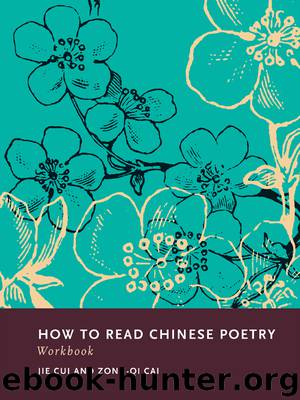How to Read Chinese Poetry Workbook by Cai Zong-qi Cui Jie

Author:Cai, Zong-qi, Cui, Jie
Language: eng
Format: epub
Tags: POE009000, Poetry/Asian, FOR003000, Foreign Language Study/Chinese
Publisher: Columbia University Press
Published: 2012-03-05T16:00:00+00:00
P51
Two Songs of Liangzhou, No. 1
[Tang Dyn.] Wang Han
The fine grape wine,
and a luminous cup—
I was about to drink it
when pipa was strummed
on horseback, urging me to hurry.
If I get drunk and lie on the battle ground
I beg you not to laugh,
Since ancient times from each expedition
how many made it back?
[ heptasyllabic regulated quatrain, tonal pattern la, see HTRCP, p. 171]
(Tr. Zong-qi Cai)
Vocabulary Notes
1. “Song of Liangzhou,” see P48 notes 1 and 2.
2. (style Zĭyŭ , 687?–726?), a famous High Tang poet known for his frontier poetry, especially this quatrain.
3. n. grape.
4. n. luminous cup.
5. n. a plucked string instrument with a fretted fingerboard. Before it was introduced to the Han people, was mainly played on horseback by the nomadic peoples in the northwest of ancient China. See also P80 note 20.
6.v. to urge. hurry. Go and hurry him up.
7. If adj. drunk, tipsy. He is drunk. See also P92 note 5.
8. v. to lie. MdnC: (tăng). He lay on the bed.
9. n. desert. Here it means “battlefield.”
10. v. don’t. See also P04 note 24.
11. v. to laugh. MdnC: (cháo xiáo) to laugh at. Don’t laugh at him.
12. n. to go on an expedition. See also P50 note 6. to go on a military expedition.
13. (zhēn) v. to pour (tea or wine) [formal].
Download
This site does not store any files on its server. We only index and link to content provided by other sites. Please contact the content providers to delete copyright contents if any and email us, we'll remove relevant links or contents immediately.
| Books & Reading | Comparative Literature |
| Criticism & Theory | Genres & Styles |
| Movements & Periods | Reference |
| Regional & Cultural | Women Authors |
4 3 2 1: A Novel by Paul Auster(12392)
The handmaid's tale by Margaret Atwood(7763)
Giovanni's Room by James Baldwin(7346)
Asking the Right Questions: A Guide to Critical Thinking by M. Neil Browne & Stuart M. Keeley(5775)
Big Magic: Creative Living Beyond Fear by Elizabeth Gilbert(5771)
Ego Is the Enemy by Ryan Holiday(5448)
The Body: A Guide for Occupants by Bill Bryson(5096)
On Writing A Memoir of the Craft by Stephen King(4944)
Ken Follett - World without end by Ken Follett(4732)
Adulting by Kelly Williams Brown(4574)
Bluets by Maggie Nelson(4556)
Eat That Frog! by Brian Tracy(4540)
Guilty Pleasures by Laurell K Hamilton(4449)
The Poetry of Pablo Neruda by Pablo Neruda(4107)
Alive: The Story of the Andes Survivors by Piers Paul Read(4032)
White Noise - A Novel by Don DeLillo(4009)
Fingerprints of the Gods by Graham Hancock(4004)
The Book of Joy by Dalai Lama(3986)
The Bookshop by Penelope Fitzgerald(3853)
